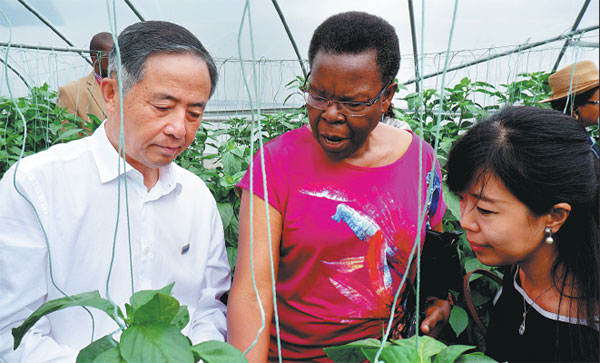
Sector seen as Africa's central nervous system
African countries are enthusiastic about Chinese assistance in agriculture and infrastructure, as the populous continent attempts to eradicate hunger in a decade and speed up modernization to achieve the aspirations of Agenda 2063, senior African officials said.
The agenda - adopted by the African Union in 2015 - aims to see Africa become a prosperous continent with the means and resources to drive its own development by 2063.
 |
|
Chen Zhigang (left), deputy director of the State Council Leading Group Office of Poverty Alleviation and Development, talks with Victoria Sekitoleko, Uganda's former agriculture minister, on the FOCAC group's tour in Bijie, Guizhou province. Li Lei / China Daily |
Nonofo Ezekiel Molefhi, minister of presidential affairs, government governance and public administration in Botswana, said agriculture offers plenty of opportunities for partnerships that can boost employment and combat poverty.
During a tour of successful poverty relief projects in Bijie, Guizhou province, in mid-August, he said Chinese methods of cultivating high-protein, fast-growing grass for livestock, which have already benefited African countries including Rwanda and South Africa, could be used to upgrade Botswana's animal farms, such as those raising Botswanan goats.
"We can also look at other opportunities in terms of agricultural production," he added.
Josefa Leonel Correia Sacko, the African Union's commissioner for rural economy and agriculture, echoed Molefhi's comments while speaking at the poverty reduction and development conference of the 2018 Forum on China-Africa Cooperation in Beijing on Aug 14.
"Agriculture is to Africa what the central nervous system is to the human body," she said, adding that African agriculture - plagued by low mechanization and a high dependence on rainfall - could see new opportunities as Chinese investments in and partnerships with African research institutes and universities accelerate the sector's transformation.
Clifford Katondo Tandari, regional administrative secretary for Morogoro, Tanzania, said simple technologies could allow farmers in some places to double or even triple their output, which is crucial for poverty relief.
Impressed by China's excellent road network, he said he expects stronger partnerships in the infrastructure sector that aim to enhance connectivity.
"Better linkages means that farmers can access enough fertilizers, and their produce could reach urban markets where they can receive better prices," Tandari said.
Emmanuel Freddie Mugunga, undersecretary of science, technology and innovation in Uganda, said China has offered help building roads and dams in his country, but he called for increased cooperation in training young engineers, scientists and entrepreneurs.
"We have lots of young people with lots of ideas, but they do not have the workplaces with shared facilities where they can go and concentrate and do things and get taught new skills," he said.
Official figures estimate that, by 2025, Africa will be home to 200 million people between 15 and 24 years of age, while one-fourth of the world's population under 25 will be from Africa. Every year, about 10 million Africans join the workforce.
China has vowed to help African countries train more young talent in poverty relief as part of its effort to strength exchanges under the framework of the Belt and Road Initiative.
The country will continue to hold training sessions on poverty reduction tailored to African countries and innovate in training methods to ensure efforts deliver real benefits, Liu Yongfu, director of the State Council Leading Group Office of Poverty Alleviation and Development, said at the opening ceremony of the FOCAC's poverty reduction and development conference.
"China and African countries have accumulated rich experience in self-development and poverty reduction. China is willing to strengthen exchanges with African countries to benefit both parties," he said.
Liu said China has held 133 poverty reduction seminars and shared its experience with 3,587 representatives from 133 countries and regions, including 2,122 from 52 African nations.
China has reduced extreme poverty by more than two-thirds over the past five years, according to figures from the central government, which has pledged to eradicate extreme poverty by the end of 2020.
Soundbites
For every program to succeed, you need to have the participation of the beneficiaries. You work to strengthen what they already know. If they are already accustomed to growing corn, there may be potential to expand their capacity by introducing cattle farming. That's what you did in Bijie (Guizhou province) by introducing Aberdeen Angus. ... You created job opportunities in a value chain. Providing jobs increases household income levels and strengthens people's capacity to do other things. Ultimately, they become less dependent on the government.

Nonofo Ezekiel Molefhi, minister of presidential affairs, government governance and public administration in Botswana
So far, we are impressed with the infrastructure in China. The road network is pretty good. This is one of the lessons we're learning on our tour. Also, the government's commitment to fighting poverty is very high, which we should also learn. You know how many they (the poor) are, and their percentage. The number is precise.

Clifford Katondo Tandari, regional administrative secretary of Morogoro, Tanzania
To address poverty, you don't just address the issue of finance. If you address education, you address poverty. If people are going to school, they are not going to have children too early. China and Uganda can work together on technical education. Also in healthcare. If one member of a family falls sick, their entire livelihood is affected. This is where we can have further cooperation.

Emmanuel Freddie Mugunga, undersecretary of science, technology and innovation in Uganda